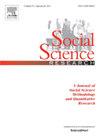Contextual variation in the effect of unemployment on subjective wellbeing in the United States
IF 3.5
2区 社会学
Q1 SOCIOLOGY
引用次数: 0
Abstract
Becoming unemployed is a disruptive event with negative consequences for psychological wellbeing. Yet, the harmful effect of unemployment might vary depending on the social context. The literature offers two opposing hypotheses about contextual variation: The economic strain approach suggests that becoming unemployed is more harmful during an economic downturn because of reduced employment opportunities and sources of support. In contrast, the social normativity approach suggests that unemployment is less harmful when unemployment is pervasive because of reduced stigma, shame, and guilt. We examine contextual variation in the effect of unemployment in the United States using longitudinal data and individual fixed effects models. We find a U-shaped pattern of contextual variation. The effect of unemployment on psychological wellbeing is smaller at very low and very high state unemployment rates and larger at moderate state unemployment rates. The decline in the harmful effect of unemployment as aggregate unemployment rises from moderate to high is consistent with the normativity hypothesis. While some variation exists across specifications, differences across aggregate levels of unemployment are significant in our preferred specifications. This pattern is similar across gender, suggesting that normative expectations about employment are relatively similar for men and women in the early 21st century. The impact of unemployment on subjective wellbeing depends on how prevalent and normative the experience of unemployment is in society.
美国失业对主观幸福感影响的语境差异
失业是一个破坏性事件,对心理健康有负面影响。然而,失业的有害影响可能因社会背景而异。文献提供了关于背景差异的两种相反的假设:经济压力方法表明,由于就业机会和支持来源减少,在经济衰退期间失业更有害。相反,社会规范理论认为,当失业普遍存在时,失业的危害较小,因为耻辱、羞耻和内疚感减少了。我们使用纵向数据和个体固定效应模型来检验美国失业影响的背景差异。我们发现语境变化呈u型模式。失业对心理健康的影响在州失业率非常低和非常高的情况下较小,在州失业率适中的情况下较大。随着总失业率从中等上升到高,失业的有害影响下降,这与规范性假设是一致的。虽然不同指标之间存在一些差异,但在我们的首选指标中,总体失业率水平之间的差异是显著的。这种模式在性别上是相似的,这表明在21世纪初,男性和女性对就业的规范性期望相对相似。失业对主观幸福感的影响取决于失业经验在社会中的普遍程度和规范性。
本文章由计算机程序翻译,如有差异,请以英文原文为准。
求助全文
约1分钟内获得全文
求助全文
来源期刊

Social Science Research
SOCIOLOGY-
CiteScore
4.30
自引率
4.00%
发文量
0
审稿时长
65 days
期刊介绍:
Social Science Research publishes papers devoted to quantitative social science research and methodology. The journal features articles that illustrate the use of quantitative methods in the empirical solution of substantive problems, and emphasizes those concerned with issues or methods that cut across traditional disciplinary lines. Special attention is given to methods that have been used by only one particular social science discipline, but that may have application to a broader range of areas.
 求助内容:
求助内容: 应助结果提醒方式:
应助结果提醒方式:


